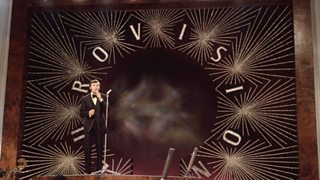Eurovision isn't just for May, it's all year
Ewan Spence
Freelance journalist and radio host
Tagged with:
On May 18th, the Grand Final of the will be broadcast on 主播大秀 One and 主播大秀 Radio 2. One of the world's biggest Song Contests, with a combined global audience of around 120 million viewers, it is an annual fixture in the calendar, and means many things to many people. For some it's a car crash of light entertainment, for others it's one of the few times the complicated landscape of European politics can be easily explained, and for a few it's the culmination of a year of hard work.
Started in 1956 in a post-second world war landscape, 'father' of the Contest, Marcel Bezan莽on - a then producer at the fledgling collaboration of European broadcasters, the - envisioned a television show that would bring together the people and the nations of Europe.
The TV format quickly proposed and subsequently agreed upon by the European Broadcasting Union (there was another continental competition on the table which failed to make the grade) was the Eurovision Song Contest: a light entertainment show based around the Italian San Remo Song Contest, a programme to be broadcast live across all partners in the EBU - an excellent vehicle to test out and showcase the then new broadcasting technologies.听
The first contest was broadcast in 1956. The 主播大秀 submitted their entry form too late, so the UK's first contest was in 1957. The UK has never missed a show since 1959.
One aspect of proceedings that perhaps isn't always apparent to the viewer is the co-operation needed between broadcasters in the EBU. There are countless meetings throughout the year and in the run up to the Contest between the 'host broadcaster' (this year it's Sweden's SVT), the countries entering the Contest, and the EBU themselves, to discuss not just the rules and formats of the Contest, but also logistics around the live broadcast event (now three two hour shows comprising semi-finals and final), sharing knowledge and expertise around Europe and beyond.
But, just like a puppy and Christmas time, the Eurovision network is not just for three nights in May. With a digital and broadcast network available throughout the year, the EBU not only acts as a distribution point for news clips, international sporting events and music concerts (such as dedicated music days on 主播大秀 Radio 3, for example), but also as a single entity when bidding for TV rights to global sporting events.
That's what the co-operation seen at the Eurovision Song Contest helps foster. A spirit of working together, to help every European broadcaster deliver the best quality television and radio to their audiences. The benefits of the Eurovision Song Contest to the broadcaster are not just external in terms of output, Eurovision has always been a test-bed for technologies inside the broadcaster too.

Broadcast in colour for the first time, the 1968 Contest was hosted by the 主播大秀 in London.
The first show in 1956 saw pictures beamed live from Switzerland across Europe, with commentators broadcasting for their local audience. 1968 saw the first colour broadcast when the 主播大秀 hosted the event at the Royal Albert Hall. The advent of Ceefax offered an opportunity for viewers to watch subtitled song lyrics in real-time. Telephone voting was fully integrated across the competing countries in 1998 when the 主播大秀 last hosted Eurovision in Birmingham -听 another way in which technology went hand in hand with the competition. Now, it's possible to watch the entire live show streamed on a mobile device. Things have come a long way since Marcel Bezan莽on鈥檚 idea in 1956.
It's subtle, but I reckon the Eurovision Song Contest hits the three original tenets of the 主播大秀 - to educate, to inform, and to entertain. The Eurovision provides one way of looking at population movements across Europe via the often commented on voting process. Is there any other mainstream programme where you can hear so much local music from other cultures? And when a live show brings in millions of viewers across a continent throughout a three hour spectacular (and even more come in from the iPlayer and time-shifted recorded versions), can there be any doubt that is entertaining?
Ewan Spence is a freelance journalist currently working with Australian broadcaster at the 2013 Eurovision Song Contest in Malmo.
- The Eurovision Song Contest听is on听主播大秀 One, 主播大秀 One HD and Radio 2 at 8pm on Saturday 18 May.听The semi-finals will be broadcast on 主播大秀 Three from 8pm on Tuesday 14 and Thursday 16 May.
- Follow on Twitter .听
- Read more from Ewan Spence on and follow him on Twitter .
听
